- Home
- Herman Melville
Moby Dick Page 16
Moby Dick Read online
Page 16
BOOK II. (Octavo), CHAPTER III. (Narwhale), that is, Nostril whale.– Another instance of a curiously named whale, so named I suppose from his peculiar horn being originally mistaken for a peaked nose. The creature is some sixteen feet in length, while its horn averages five feet, though some exceed ten, and even attain to fifteen feet. Strictly speaking, this horn is but a lengthened tusk, growing out from the jaw in a line a little depressed from the horizontal. But it is only found on the sinister side, which has an ill effect, giving its owner something analogous to the aspect of a clumsy left-handed man. What precise purpose this ivory horn or lance answers, it would be hard to say. It does not seem to be used like the blade of the sword-fish and bill-fish; though some sailors tell me that the Narwhale employs it for a rake in turning over the bottom of the sea for food. Charley Coffin said it was used for an ice-piercer; for the Narwhale, rising to the surface of the Polar Sea, and finding it sheeted with ice, thrusts his horn up, and so breaks through. But you cannot prove either of these surmises to be correct. My own opinion is, that however this one-sided horn may really be used by the Narwhale-however that may be-it would certainly be very convenient to him for a folder in reading pamphlets. The Narwhale I have heard called the Tusked whale, the Horned whale, and the Unicorn whale. He is certainly a curious example of the Unicornism to be found in almost every kingdom of animated nature. From certain cloistered old authors I have gathered that this same sea-unicorn's horn was in ancient days regarded as the great antidote against poison, and as such, preparations of it brought immense prices. It was also distilled to a volatile salts for fainting ladies the same way that the horns of the male deer are manufactured into hartshorn. Originally it was in itself accounted an object of great curiosity. Black Letter tells me that Sir Martin Frobisher on his return from that voyage, when Queen Bess did gallantly wave her jewelled hand to him from a window of Greenwich Palace, as his bold ship sailed down the Thames; "when Sir Martin returned from that voyage," saith Black Letter, "on bended knees he presented to her highness a prodigious long horn of the Narwhale, which for a long period after hung in the castle at Windsor." An Irish author avers that the Earl of Leicester, on bended knees, did likewise present to her highness another horn, pertaining to a land beast of the unicorn nature.
The Narwhale has a very picturesque, leopard-like look, being of a milk-white ground color, dotted with round and oblong spots of black. His oil is very superior, clear and fine; but there is little of it, and he is seldom hunted. He is mostly found in the circumpolar seas.
BOOK II. (Octavo), CHAPTER IV. (Killer).-Of this whale little is precisely known to the Nantucketer, and nothing at all to the professed naturalists. From what I have seen of him at a distance, I should say that he was about the bigness of a grampus. He is very savage-a sort of Feegee fish. He sometimes takes the great Folio whales by the lip, and hangs there like a leech, till the mighty brute is worried to death. The Killer is never hunted. I never heard what sort of oil he has. Exception might be taken to the name bestowed upon this whale, on the ground of its indistinctness. For we are all killers, on land and on sea; Bonapartes and Sharks included.
BOOK II. (Octavo), CHAPTER V. (Thrasher).-This gentleman is famous for his tail which he uses for a ferule in thrashing his foes. He mounts the Folio whale's back, and as he swims, he works his passage by flogging him; as some schoolmasters get along in the world by a similar process. Still less is known of the Thrasher than of the Killer. Both are outlaws, even in the lawless seas.
Thus ends BOOK II. (Octavo), and begins BOOK III, (Duodecimo.)
DUODECIMOES.-These include the smaller whales. I. The Huzza Porpoise. II. The Algerine Porpoise. III. The Mealy-mouthed Porpoise.
To those who have not chanced specially to study the subject, it may possibly seem strange, that fishes not commonly exceeding four or five feet should be marshalled among WHALES-a word, which, in the popular sense, always conveys an idea of hugeness. But the creatures set down above as Duodecimoes are infallibly whales, by the terms of my definition of what a whale is-i.e. a spouting fish, with a horizontal tail.
BOOK III. (Duodecimo), CHAPTER 1. (Huzza Porpoise).-This is the common porpoise found almost all over the globe. The name is of my own bestowal; for there are more than one sort of porpoises, and something must be done to distinguish them. I call him thus, because he always swims in hilarious shoals, which upon the broad sea keep tossing themselves to heaven like caps in a Fourth-of-July crowd. Their appearance is generally hailed with delight by the mariner. Full of fine spirits, they invariably come from the breezy billows to windward. They are the lads that always live before the wind. They are accounted a lucky omen. If you yourself can withstand three cheers at beholding these vivacious fish, then heaven help ye; the spirit of godly gamesomeness is not in ye. A well-fed, plump Huzza Porpoise will yield you one good gallon of good oil. But the fine and delicate fluid extracted from his jaws is exceedingly valuable. It is in request among jewellers and watchmakers. Sailors put it on their hones. Porpoise meat is good eating, you know. It may never have occurred to you that a porpoise spouts. Indeed, his spout is so small that it is not very readily discernible. But the next time you have a chance, watch him; and you will then see the great Sperm whale himself in miniature.
BOOK III. (Duodecimo), CHAPTER II. (Algerine Porpoise).-A pirate. Very savage. He is only found, I think, in the Pacific. He is somewhat larger than the Huzza Porpoise, but much of the same general make. Provoke him, and he will buckle to a shark. I have lowered for him many times, but never yet saw him captured.
BOOK III. (Duodecimo), CHAPTER III. (Mealy-mouthed Porpoise).-The largest kind of Porpoise; and only found in the Pacific, so far as it is known. The only English name, by which he has hitherto been designated, is that of the fisher-Right-Whale Porpoise, from the circumstance that he is chiefly found in the vicinity of that Folio. In shape, he differs in some degree from the Huzza Porpoise, being of a less rotund and jolly girth; indeed, he is of quite a neat and gentleman-like figure. He has no fins on his back (most other porpoises have), he has a lovely tail, and sentimental Indian eyes of a hazel hue. But his mealy-mouth spoils all. Though his entire back down to his side fins is of a deep sable, yet a boundary line, distinct as the mark in a ship's hull, called the "bright waist," that line streaks him from stem to stern, with two separate colors, black above and white below. The white comprises part of his head, and the whole of his mouth, which makes him look as if he had just escaped from a felonious visit to a meal-bag. A most mean and mealy aspect! His oil is much like that of the common porpoise.
Beyond the DUODECIMO, this system does not proceed, inasmuch as the Porpoise is the smallest of the whales. Above, you have all the Leviathans of note. But there are a rabble of uncertain, fugitive, half-fabulous whales, which, as an American whaleman, I know by reputation, but not personally. I shall enumerate them by their fore-castle appellations; for possibly such a list may be valuable to future investigators, who may complete what I have here but begun. If any of the following whales, shall hereafter be caught and marked, then he can readily be incorporated into this System, according to his Folio, Octavo, or Duodecimo magnitude:– The Bottle-Nose Whale; the Junk Whale; the Pudding-Headed Whale; the Cape Whale; the Leading Whale; the Cannon Whale; the Scragg Whale; the Coppered Whale; the Elephant Whale; the Iceberg Whale; the Quog Whale; the Blue Whale; &c. From Icelandic, Dutch, and old English authorities, there might be quoted other lists of uncertain whales, blessed with all manner of uncouth names. But I omit them as altogether obsolete; and can hardly help suspecting them for mere sounds, full of Leviathanism, but signifying nothing.
Finally: It was stated at the outset, that this system would not be here, and at once, perfected. You cannot but plainly see that I have kept my word. But I now leave my cetological System standing thus unfinished, even as the great Cathedral of Cologne was left, with the cranes still standing upon the top of the uncompleted tower. For small erections may be finished by their first archit
ects; grand ones, true ones, ever leave the copestone to posterity. God keep me from ever completing anything. This whole book is but a draught-nay, but the draught of a draught. Oh, Time, Strength, Cash, and Patience!
CHAPTER 33: The Specksynder
Concerning the officers of the whale-craft, this seems as good a place as any to set down a little domestic peculiarity on ship-board, arising from the existence of the harpooneer class of officers, a class unknown of course in any other marine than the whale-fleet.
The large importance attached to the harpooneer's vocation is evinced by the fact, that originally in the old Dutch Fishery, two centuries and more ago, the command of a whale-ship was not wholly lodged in the person now called the captain, but was divided between him and an officer called the Specksynder. Literally this word means Fat-Cutter; usage, however, in time made it equivalent to Chief Harpooneer. In those days, the captain's authority was restricted to the navigation and general management of the vessel; while over the whale-hunting department and all its concerns, the Specksynder or Chief Harpooneer reigned supreme. In the British Greenland Fishery, under the corrupted title of Specksioneer, this old Dutch official is still retained, but his former dignity is sadly abridged. At present he ranks simply as senior Harpooneer; and as such, is but one of the captain's more inferior subalterns. Nevertheless, as upon the good conduct of the harpooneers the success of a whaling voyage largely depends, and since in the American Fishery he is not only an important officer in the boat, but under certain circumstances (night watches on a whaling ground) the command of the ship's deck is also his; therefore the grand political maxim of the sea demands, that he should nominally live apart from the men before the mast, and be in some way distinguished as their professional superior; though always, by them, familiarly regarded as their social equal.
Now, the grand distinction drawn between officer and man at sea, is this-the first lives aft, the last forward. Hence, in whale-ships and merchantmen alike, the mates have their quarters with the captain; and so, too, in most of the American whalers the harpooneers are lodged in the after part of the ship. That is to say, they take their meals in the captain's cabin, and sleep in a place indirectly communicating with it.
Though the long period of a Southern whaling voyage (by far the longest of all voyages now or ever made by man), the peculiar perils of it, and the community of interest prevailing among a company, all of whom, high or low, depend for their profits, not upon fixed wages, but upon their common luck, together with their common vigilance, intrepidity, and hard work; though all these things do in some cases tend to beget a less rigorous discipline than in merchantmen generally; yet, never mind how much like an old Mesopotamian family these whalemen may, in some primitive instances, live together; for all that, the punctilious externals, at least, of the quarter-deck are seldom materially relaxed, and in no instance done away. Indeed, many are the Nantucket ships in which you will see the skipper parading his quarter-deck with an elated grandeur not surpassed in any military navy; nay, extorting almost as much outward homage as if he wore the imperial purple, and not the shabbiest of pilot-cloth.
And though of all men the moody captain of the Pequod was the least given to that sort of shallowest assumption; and though the only homage he ever exacted, was implicit, instantaneous obedience; though he required no man to remove the shoes from his feet ere stepping upon the quarter-deck; and though there were times when, owing to peculiar circumstances connected with events hereafter to be detailed, he addressed them in unusual terms, whether of condescension or in terrorem, or otherwise; yet even Captain Ahab was by no means unobservant of the paramount forms and usages of the sea.
Nor, perhaps, will it fail to be eventually perceived, that behind those forms and usages, as it were, he sometimes masked himself; incidentally making use of them for other and more private ends than they were legitimately intended to subserve. That certain sultanism of his brain, which had otherwise in a good degree remained unmanifested; through those forms that same sultanism became incarnate in an irresistible dictatorship. For be a man's intellectual superiority what it will, it can never assume the practical, available supremacy over other men, without the aid of some sort of external arts and entrenchments, always, in themselves, more or less paltry and base. This it is, that for ever keeps God's true princes of the Empire from the world's hustings; and leaves the highest honors that this air can give, to those men who become famous more through their infinite inferiority to the choice hidden handful of the Divine Inert, than through their undoubted superiority over the dead level of the mass. Such large virtue lurks in these small things when extreme political superstitions invest them, that in some royal instances even to idiot imbecility they have imparted potency. But when, as in the case of Nicholas the Czar, the ringed crown of geographical empire encircles an imperial brain; then, the plebeian herds crouch abased before the tremendous centralization. Nor, will the tragic dramatist who would depict mortal indomitableness in its fullest sweep and direct swing, ever forget a hint, incidentally so important in his art, as the one now alluded to.
But Ahab, my Captain, still moves before me in all his Nantucket grimness and shagginess; and in this episode touching Emperors and Kings, I must not conceal that I have only to do with a poor old whale-hunter like him; and, therefore, all outward majestical trappings and housings are denied me. Oh, Ahab! what shall be grand in thee, it must needs be plucked at from the skies, and dived for in the deep, and featured in the unbodied air!
CHAPTER 34: The Cabin-Table
It is noon; and Dough-Boy, the steward, thrusting his pale loaf-of-bread face from the cabin-scuttle, announces dinner to his lord and master who, sitting in the lee quarter-boat, has just been taking an observation of the sun; and is now mutely reckoning the latitude on the smooth, medallion-shaped tablet, reserved for that daily purpose on the upper part of his ivory leg. From his complete inattention to the tidings, you would think that moody Ahab had not heard his menial. But presently, catching hold of the mizen shrouds, he swings himself to the deck, and in an even, unexhilarated voice, saying, "Dinner, Mr. Starbuck," disappears into the cabin.
When the last echo of his sultan's step has died away, and Starbuck, the first Emir, has every reason to suppose that he is seated, then Starbuck rouses from his quietude, takes a few turns along the planks, and, after a grave peep into the binnacle, says, with some touch of pleasantness, "Dinner, Mr. Stubb," and descends the scuttle. The second Emir lounges about the rigging awhile, and then slightly shaking the main brace, to see whether it will be all right with that important rope, he likewise takes up the old burden, and with a rapid "Dinner, Mr. Flask," follows after his predecessors.
But the third Emir, now seeing himself all alone on the quarter-deck, seems to feel relieved from some curious restraint; for, tipping all sorts of knowing winks in all sorts of directions, and kicking off his shoes, he strikes into a sharp but noiseless squall of a hornpipe right over the Grand Turk's head; and then, by a dexterous sleight, pitching his cap up into the mizentop for a shelf, he goes down rollicking so far at least as he remains visible from the deck, reversing all other processions, by bringing up the rear with music. But ere stepping into the cabin doorway below, he pauses, ships a new face altogether, and, then, independent, hilarious little Flask enters King Ahab's presence, in the character of Abjectus, or the Slave.
It is not the least among the strange things bred by the intense artificialness of sea-usages, that while in the open air of the deck some officers will, upon provocation, bear themselves boldly and defyingly enough towards their commander; yet, ten to one, let those very officers the next moment go down to their customary dinner in that same commander's cabin, and straightway their inoffensive, not to say deprecatory and humble air towards him, as he sits at the head of the table; this is marvellous, sometimes most comical. Wherefore this difference? A problem? Perhaps not. To have been Belshazzar, King of Babylon; and to have been Belshazzar, not haughtily but courteously, ther
ein certainly must have been some touch of mundane grandeur. But he who in the rightly regal and intelligent spirit presides over his own private dinner-table of invited guests, that man's unchallenged power and dominion of individual influence for the time; that man's royalty of state transcends Belshazzar's, for Belshazzar was not the greatest. Who has but once dined his friends, has tasted what it is to be Caesar. It is a witchery of social czarship which there is no withstanding. Now, if to this consideration you super-add the official supremacy of a ship-master, then, by inference, you will derive the cause of that peculiarity of sea-life just mentioned.
Over his ivory-inlaid table, Ahab presided like a mute, maned sea-lion on the white coral beach, surrounded by his war-like but still deferential cubs. In his own proper turn, each officer waited to be served. They were as little children before Ahab; and yet, in Ahab, there seemed not to lurk the smallest social arrogance. With one mind, their intent eyes all fastened upon the old man's knife, as he carved the chief dish before him. I do not suppose that for the world they would have profaned that moment with the slightest observation, even upon so neutral a topic as the weather. No! And when reaching out his knife and fork, between which the slice of beef was locked, Ahab thereby motioned Starbuck's plate towards him, the mate received his meat as though receiving alms; and cut it tenderly; and a little started if, perchance, the knife grazed against the plate; and chewed it noiselessly; and swallowed it, not without circumspection. For, like the Coronation banquet at Frankfort, where the German Emperor profoundly dines with the seven Imperial Electors, so these cabin meals were somehow solemn meals, eaten in awful silence; and yet at table old Ahab forbade not conversation; only he himself was dumb. What a relief it was to choking Stubb, when a rat made a sudden racket in the hold below. And poor little Flask, he was the youngest son, and little boy of this weary family party. His were the shin-bones of the saline beef; his would have been the drumsticks. For Flask to have presumed to help himself, this must have seemed to him tantamount to larceny in the first degree. Had he helped himself at that table, doubtless, never more would he have been able to hold his head up in this honest world; nevertheless, strange to say, Ahab never forbade him. And had Flask helped himself, the chances were Ahab had never so much as noticed it. Least of all, did Flask presume to help himself to butter. Whether he thought the owners of the ship denied it to him, on account of its clotting his clear, sunny complexion; or whether he deemed that, on so long a voyage in such marketless waters, butter was at a premium, and therefore was not for him, a subaltern; however it was, Flask, alas! was a butterless man!

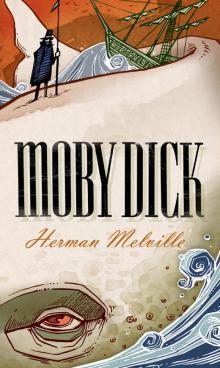 Moby Dick; Or, The Whale
Moby Dick; Or, The Whale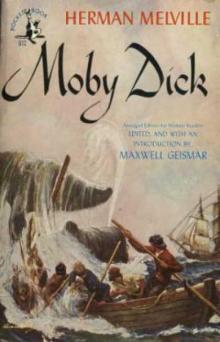 Moby Dick
Moby Dick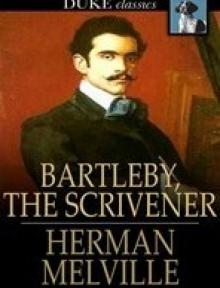 Benito Cereno and Bartleby the Scrivener
Benito Cereno and Bartleby the Scrivener Israel Potter: His Fifty Years of Exile (Annotated Edition)
Israel Potter: His Fifty Years of Exile (Annotated Edition) Billy Budd and the Piazza Tales
Billy Budd and the Piazza Tales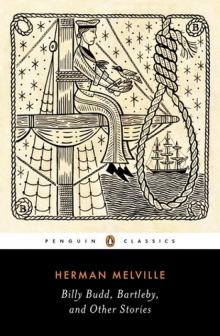 Billy Budd, Bartleby, and Other Stories
Billy Budd, Bartleby, and Other Stories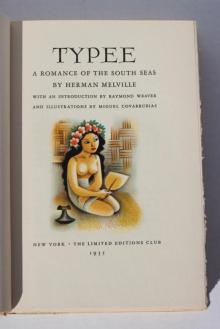 Typee: A Romance of the South Seas
Typee: A Romance of the South Seas Omoo: Adventures in the South Seas
Omoo: Adventures in the South Seas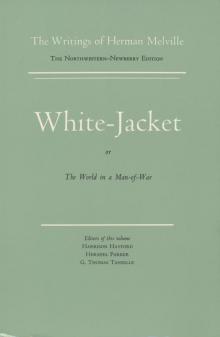 White Jacket; Or, The World on a Man-of-War
White Jacket; Or, The World on a Man-of-War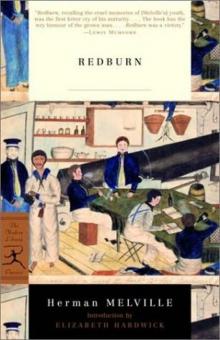 Redburn. His First Voyage
Redburn. His First Voyage Mardi: and A Voyage Thither, Vol. II
Mardi: and A Voyage Thither, Vol. II Typee
Typee The Paradise of Bachelors and the Tartarus of Maids
The Paradise of Bachelors and the Tartarus of Maids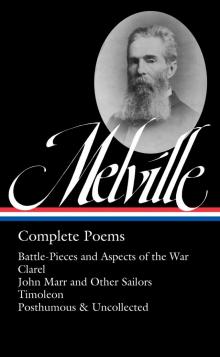 Herman Melville- Complete Poems
Herman Melville- Complete Poems Bartleby and Benito Cereno
Bartleby and Benito Cereno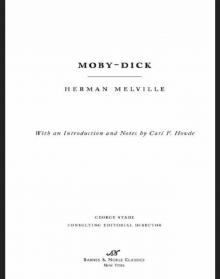 Moby-Dick (Barnes & Noble Classics Series)
Moby-Dick (Barnes & Noble Classics Series) Mardi and a Voyage Thither
Mardi and a Voyage Thither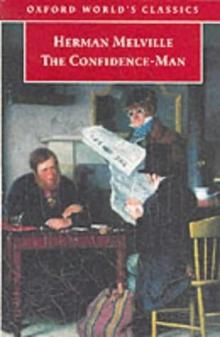 The Confidence-Man
The Confidence-Man Billy Budd and Other Stories
Billy Budd and Other Stories Bartleby the Scrivener
Bartleby the Scrivener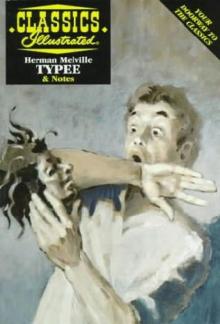 Typee: A Romance of the South Sea
Typee: A Romance of the South Sea I and My Chimney
I and My Chimney Billy Budd
Billy Budd Pierre, Or the Ambiguities
Pierre, Or the Ambiguities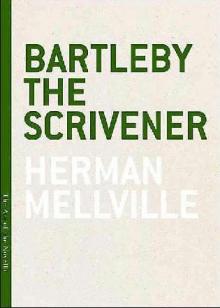 Bartleby, The Scrivener A Story of Wall-Street
Bartleby, The Scrivener A Story of Wall-Street Four Great American Classics
Four Great American Classics White Jacket or, The World on a Man-of-War
White Jacket or, The World on a Man-of-War The Piazza Tales
The Piazza Tales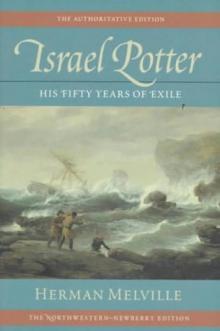 Israel Potter. Fifty Years of Exile
Israel Potter. Fifty Years of Exile